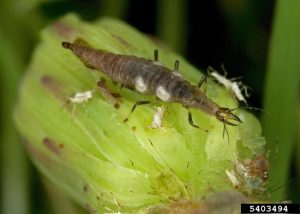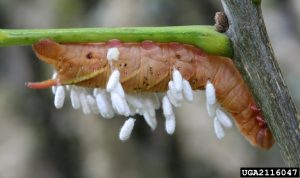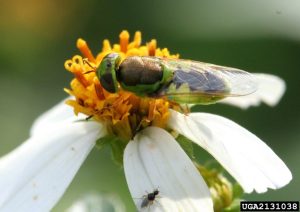When it comes to managing pests in the garden, pesticides often seem like a quick and effective solution. However, over-reliance on them can lead to pesticide resistance and potentially harm our increasingly fragile ecosystems. That’s where natural enemies come into play – beneficial insects that act as nature’s pest control.

Predators such as lacewings, lady beetles, minute pirate bugs, big eyed bugs, syrphid flies, and praying mantis, alongside parasitoids like tachinid flies and parasitoid wasps, help maintain balance by feeding on pests or laying their eggs inside or on them. Supporting these beneficial insects ensures that we rely less on chemicals and more on nature’s own pest control mechanisms. One of the best ways to support these garden allies is by creating an environment rich in plant diversity. In regions like central Florida, where year-round blooms are possible, maintaining a continuous supply of flowering plants ensures that beneficial insects can thrive throughout the year.
A variety of culinary herbs can be incorporated into the landscape such as:
- dill
- cilantro
- parsley
- fennel
- lemon balm
- horsemint/bee balm
- spearmint
- thyme
- basil
- catnip
- peppermint
Wildflowers and ornamentals provide nectar and pollen, key resources for adult foraging insects, including:
- echinacea
- yarrow
- calendula
- chamomile
- coreopsis
- gaillardia
- cosmos
- zinnia
- goldenrod
- rouge plant
- porterweed
- liatris
- sweet alyssum
- rattlesnake master
- stokes aster
- rudbeckia
Woody perennials and trees should not be overlooked as they offer both shelter and food, including:
- crape myrtle
- oaks
- hollies
- chickasaw plum
- button bush
- firebush
Native bunch grasses are also essential, offering refuge for reproductive insects to lay their eggs and raise their young. Some common native species of bunch grasses include:
- muhly grass
- Elliot’s love grass
- purple love grass
- lopsided Indian grass
- Fakahatchee grass
- Florida gama grass

Minimizing disturbances is equally important for fostering natural enemies in the garden. Before reaching for a pesticide, start by scouting your garden and first identifying the pest. Florida alone is home to over 12,500 insect species, and only 1-3% are actually considered pests, so proper identification is key! Simple hand removal or physical methods are often effective for many insect pests. If chemical intervention becomes necessary, choose non-toxic or less-toxic options, such as microbial insecticides like Bt, or horticultural oils and soaps. Always avoid applying pesticides when plants are in bloom, and opt for targeted chemistries and mindful applications as a last resort.

Finally, rethinking how we manage our landscapes can make a big difference. Reducing frequent mowing, tilling, and debris removal allows beneficial insects, especially those that live in leaf litter or hollow plant stems, to establish stable populations. A slightly wilder, less manicured garden can be a haven for these natural enemies, giving them the time and space to do their part in maintaining a healthy, balanced ecosystem.
By embracing this approach, we can cultivate a garden that not only supports beneficial insects but also leads to more sustainable pest management overall.
Be sure to check out the following links for more information!
Finding native and Florida-Friendly plants in your area:
Resources:
- Native Plants for Pollinators and Beneficial Insects: Florida – Xerces Society for Insect Conservation
- A Florida-Friendly Approach to Pest Management in Your Edible Landscape
- Florida-Friendly Landscaping Bee Gardens Application
- Florida-Friendly Landscaping Butterfly Gardens Application
 7
7
